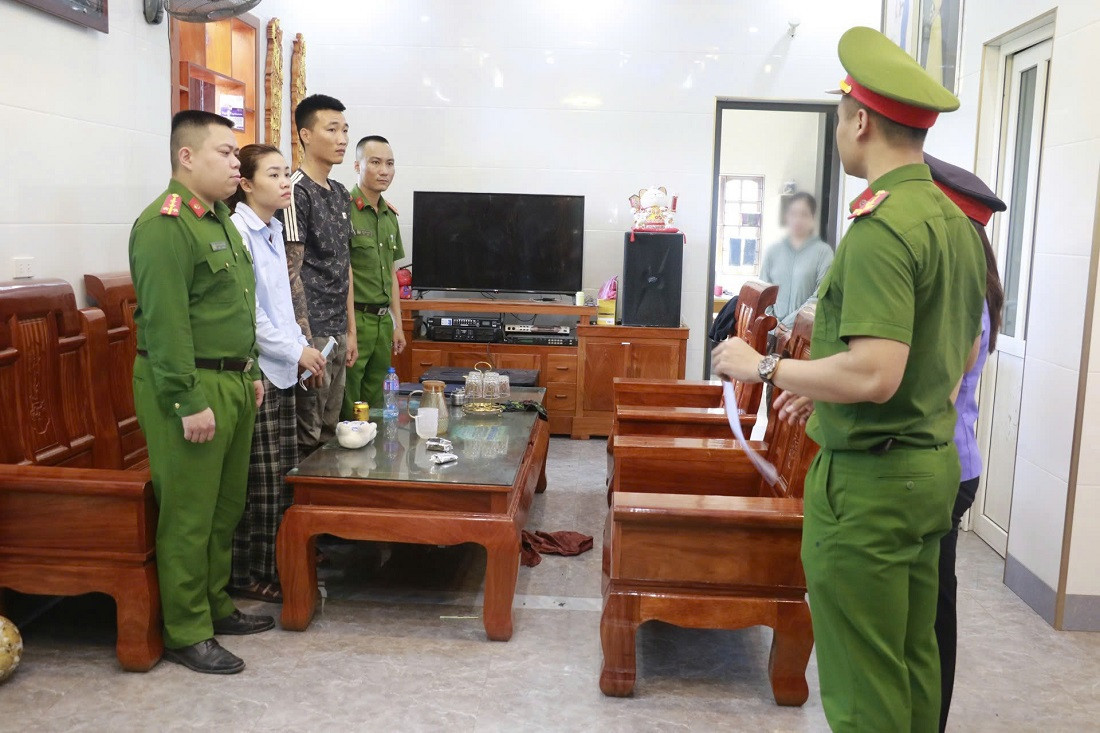
On June 25, Nghe An Police announced the arrest of nearly 100 suspects in a transnational scam operation that caused Vietnamese citizens to lose over VND2,000 billion.
Among those arrested and prosecuted, two ringleaders were identified: Phan Dinh Thinh (born 1995) and Le Thi Tra (born 1999), both from Hung Dao Commune, Hung Nguyen District, Nghe An province.
The investigation agency revealed that the criminal ring was led by a foreign mastermind, with many Vietnamese participants. It operated with two branches based in Myanmar and the Philippines.
Each branch of the ring was managed by a Vietnamese individual, organized like a company with tight coordination, sophisticated structure, and clear division of roles, with salaries based on rank for efficient control.
According to the police, the scammers were professionally trained with pre-built scenarios to lead the victims to transfer money to buy goods on e-commerce platforms to receive huge commissions.
They also swindled victims with emotional fraud scenarios - making friends, and dating to manipulate the victims.
Fraudsters were all “trained” in both fraud scenarios and scenarios for dealing with the authorities when arrested. The total number of people involved in the organization at both branches was more than 300.
The gang members recruited people from Vietnam to Myanmar and the Philippines to carry out their fraud activities. The members flew to Thailand legally, then illegally crossed the border from Thailand to Myanmar or flew directly from Vietnam to the Philippines to join the criminal organization.
Many suspects used fake social media accounts, posing images of beautiful women with high incomes and lavish lifestyles, targeting successful men on Facebook to build relationships.
After establishing trust, the scammers lured victims to Viber for further communication. After talking for about two days on Viber, the subjects invited the victims to make investment under the form of asking the victims to perform tasks to receive gifts from the e-commerce platform (in fact, this is a ghost e-commerce platform set up by the subjects to carry out fraudulent acts).
After performing initial tasks, victims received both “commissions and principal” to build trust. Once hooked, victims were asked to perform more tasks requiring larger payments, which were never refunded due to “system errors” or “incorrect syntax”. To get money back, victims were demanded to pay more money, that was ultimately appropriated.
The investigation found that with these tactics, the group defrauded Vietnamese citizens of over VND2,000 billion.
To counter these scams, the police recommend that people not listen to and follow the enticements of financial investment on cyberspace;
They said people should not participate in group chats; and not invest in websites and applications without carefully researching information about the managing unit.
Also, never transfer money or share personal information, bank accounts, passwords, or OTP codes online. Report suspected scams to the nearest police station immediately.
Recently, HCM City Police also outlined four golden rules to avoid becoming a scam victim:
Don’t trust, don’t fear, don’t transfer money.
Don’t share personal information, account details, or OTP codes.
Verify information from multiple sources before acting.
Report suspicious activity to the nearest police station.
The police also recommended that schools should organize extracurricular classes on skills to handle scam calls. Families should practice hypothetical scenarios, for example, "If your child calls to borrow money, what will you do?", or install spam call blocking software, and scam warning applications.
Lawyer Le Van Kien, Head of the Anh Sang Cong Ly Law Office, said that given the scale and level of the crime, the two subjects, Phan Dinh Thinh, born in 1995, and Le Thi Tra, born in 1999, both residing in Hung Nguyen district, Nghe An province, may be prosecuted for the crime of "fraudulent appropriation of property" according to the provisions of Clause 4, Article 174 of the Penal Code.
This is the highest penalty of Article 174 with a sentence of 12 to 20 years or life imprisonment.
In addition, the subjects may also be subject to additional penalties including a fine of VND10-100 million, a ban on holding a position, a ban on practicing a profession or doing certain jobs for 1 - 5 years or confiscation of part or all of their assets.
Thien Luong - Y Nhuy